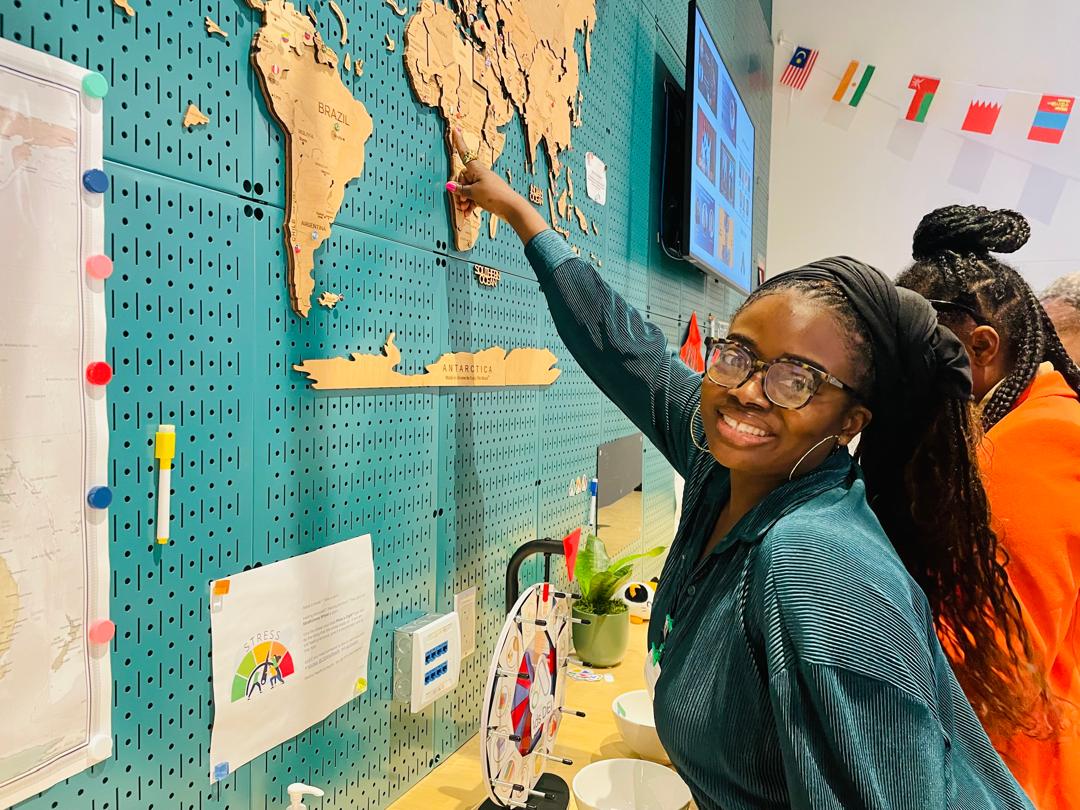
I’m hardly a woman of few words, but I like my many words to be true: my experience at the 15th anniversary of the Silicon Valley African Film Festival (SVAFF) held in California felt like stepping into a world of boundless African storytelling. I knew it would be special, but I had no idea how transformative it would be. The air buzzed with excitement as 85 films from 38 countries showcased the rich diversity of African identities and cultures. Each film — from animations to documentaries and narratives — added its unique voice to the vibrant celebration that was SVAFF 2024. Armed with my festival essentials — a camera, notepad, and a killer outfit — I dove right in. The Tuesday evening was a soft introduction, mingling with creatives, sharing stories, and soaking in the pre-festival energy.
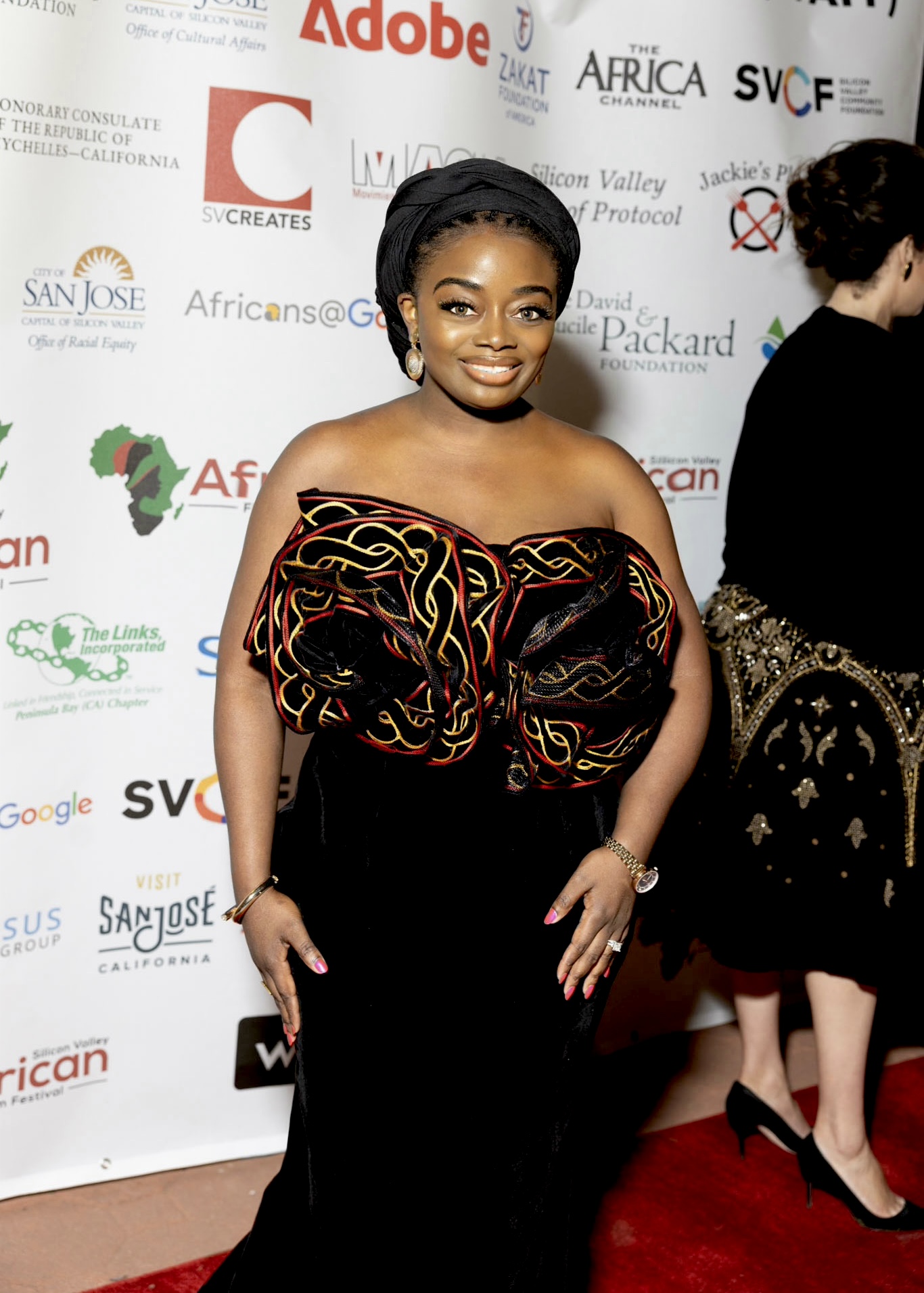
Wednesday – Let’s Get to Work: Festival Prep
That afternoon was all about Industry Day, and what a day it was. We kicked off at YouTube, hosted by their Black Executives. As the week rolled on, we’d hit other Silicon Valley giants like Google HQ and Adobe. Adobe didn’t come to play — they served us plantain and suya. Shoutout to the chefs; they understood the assignment.
The rest of Wednesday was spent meeting the festival team, picking up the icons, and ironing out logistics. The camaraderie was undeniable — everyone was on the same mission: uplifting our stories and celebrating African cinema. Long conversations in “big English” and “phonè” flew across the tables while my mind buzzed with ideas to make my panel informative and transformative. As night fell, I slipped out for a quick bite and stumbled upon the festival’s low-key welcome dinner. The vibes were right, and the spicy jollof with grilled chicken — paired with an ice-cold coffee — was exactly what I needed to fuel the creative fire for the days ahead.
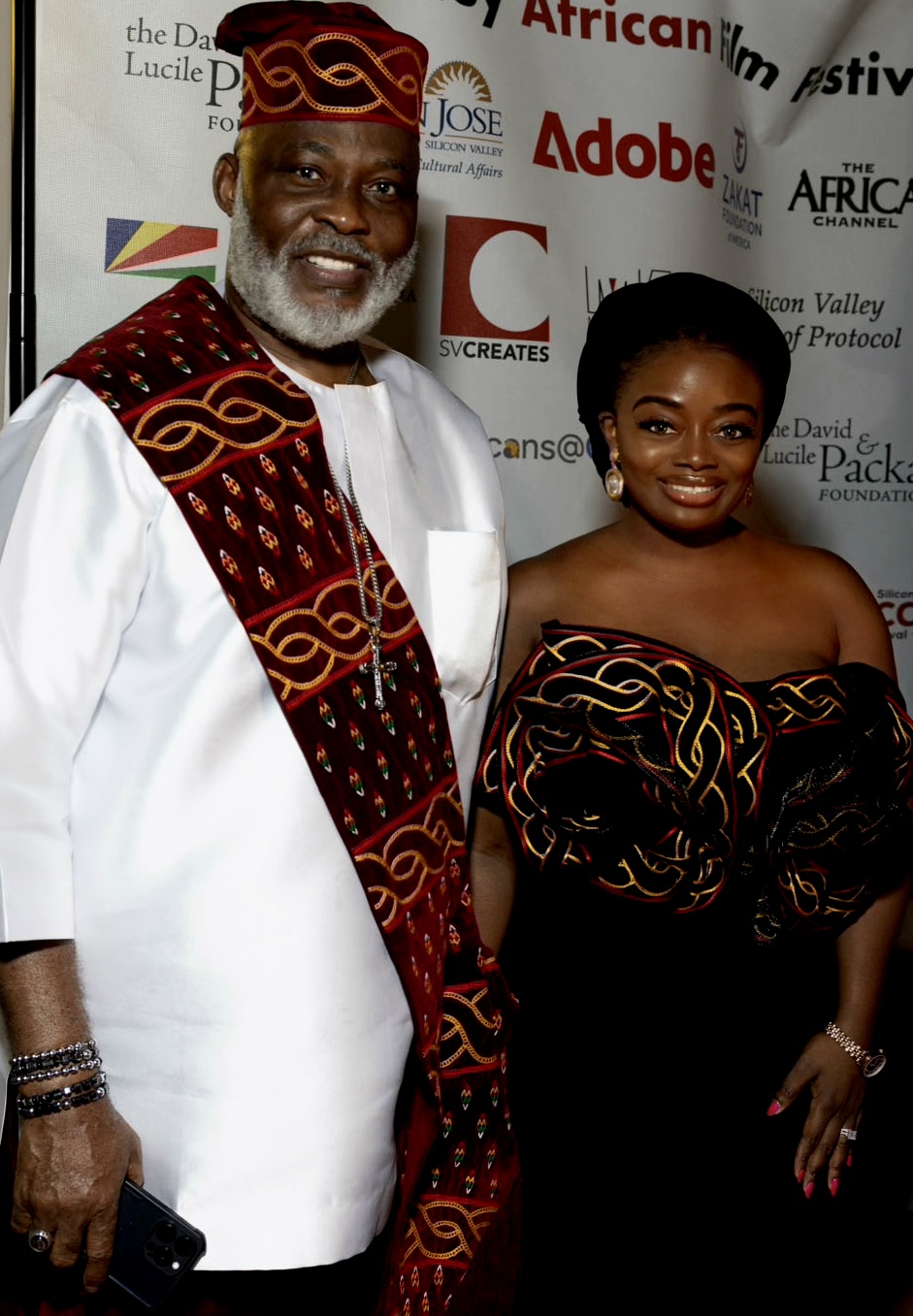
Thursday – Panel Day: African Women in Cinema
Thursday was finally here, and my excitement was off the charts. It was the first-ever African African Film Summit themed “Identities and Representations in African Cinema.” The event featured powerful sessions such as “African Cinema in Film Studies Curricula,” “The Business of Film—African Films and Global Distribution,” and “Decolonising the Gaze in Global Media Reporting.“ I moderated the “African Women in Cinema“ panel with the incredible Nisha Kalema (Uganda) and Stana Roumillac (French Guiana). Stepping on stage felt like entering an arena of greatness; you should have seen my mini gele, sapped up like the true Iyawo that I am.
Nisha shared her journey from Uganda to the global stage, highlighting authenticity and cultural importance in storytelling using matoke as an example. Stana brought the Afro-French perspective, offering insights into navigating multiple identities in film. Her experience resonated with the younger filmmakers in the room.
Later, in a fireside chat with Ngozi Onwurah candidly about women’s challenges in the industry, sharing insights into the struggles of women in the industry and asserting that women need to support each other and not tear each other down. The energy in the room was electric as I engaged the audience, sparking deep reflection and lively debate.
![]()
A Historical Friday
Friday was an immersive dive into cinema, starting with the children’s program, a partnership between the Silicon Valley African Film Festival (SVAFF) and the Santa Clara County Alliance of Black Educators (SCCABE). Middle school students and teachers came together for screenings and discussions, highlighting the power of film in education.
A small group of us visited Google HQ in Mountain View, and the trip was incredible. I saw the “Peters Projection” world map, which accurately shows how massive Africa truly is. I got to pin Cameroon in Google’s creator room, where visitors are encouraged to leave their mark. I was one of the first Cameroonians to ever step foot in there. It felt so rad, so historic, yet I was mindful of the weight of that moment.
As night fell, the festival’s glamorous opening kicked off with a red carpet where important figures in sleek, bold African attire mingled. Feeling fabulous in my killer outfit by Cameroonian designer Sulet Noir, I worked the crowd. Later, we screened “Makula,” the opening film by Nisha Kalema from my panel which won Best Narrative Feature. Her storytelling — deep, poignant, and unapologetically powerful—was a proud moment for Uganda.
Networking flowed throughout the evening as filmmakers and attendees connected, shared ideas, and bonded over their love of cinema. I spent time with budding filmmakers, hearing their dreams and challenges, and feeling the collective energy and hustle that reminds me why I love this industry.
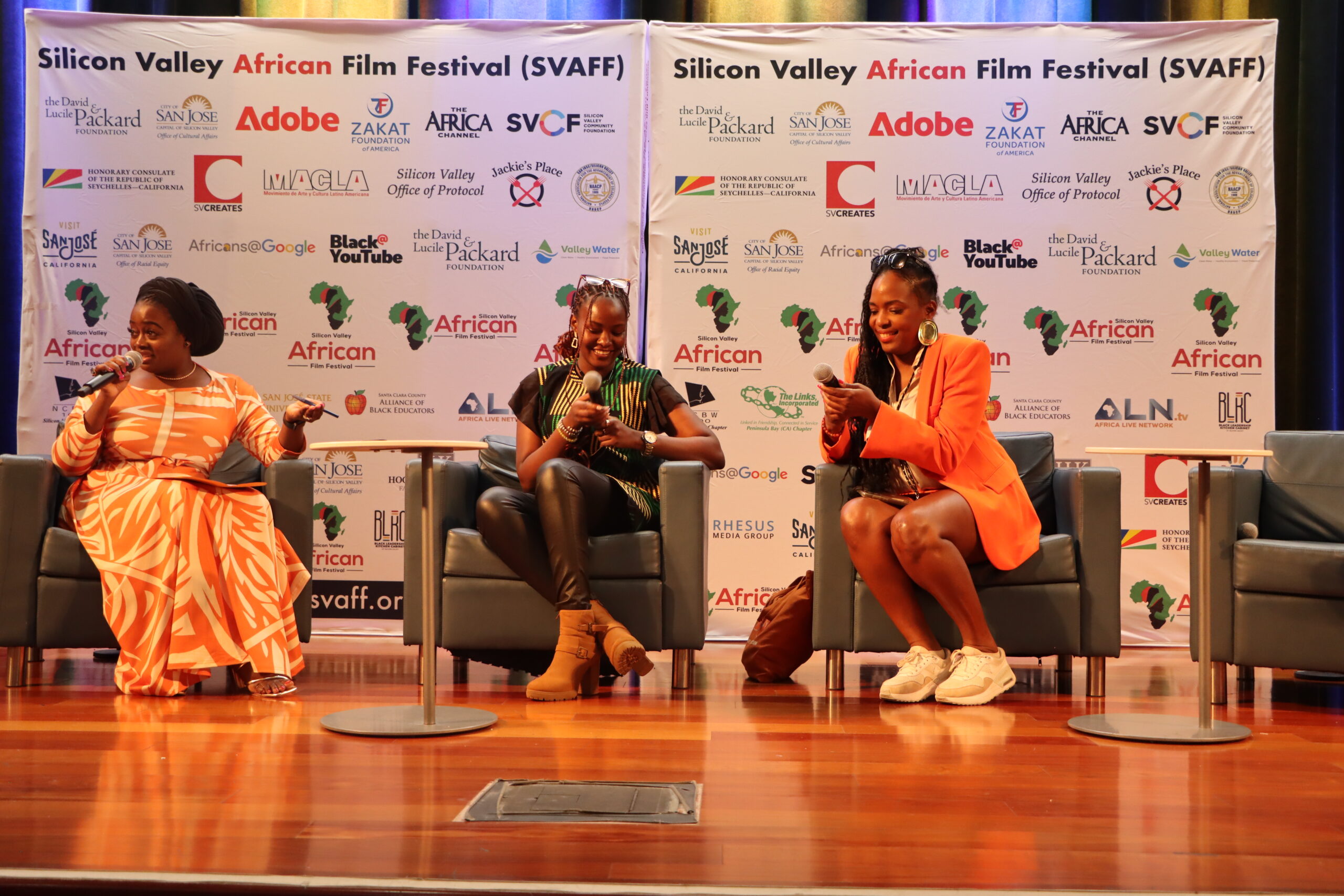
Saturday – Pre-Awards Glow and Plenty of Films to Watch
Waking up on Saturday was bittersweet, knowing the festival was nearing its end, but I kept the momentum high. I attended screenings that offered fresh perspectives, from documentaries on social issues to comedies that had us laughing out loud. That afternoon, I joined vibrant discussions on the future of African cinema and the power of mentorship. The energy in those hallway convos was electric. I even held one-on-one interviews, including an explosive chat with John Kani. Sitting with young filmmakers hungry for guidance was resonant—just a few years ago in Cameroon, I was in their shoes, eager to grow.
Films at the Festival
Besides the opening film, many others left a lasting impact, but the one that truly touched me was “Ngoungoure: Queen for 30 Minutes” by Aissatou Njayou. This gripping Cameroonian film follows Ngoungoure, the last living child of a legitimate Bamoun ruler, as she bravely leads an effort to restore her dynasty. Despite spanning for just 30 minutes, her courage and strategic brilliance left me reflecting on leadership and legacy, especially among women in history. I also loved the shorts ‘‘Neighborhood Watch’’ by Ngozi Onwurah and Tina, and “When Will You Marry,” by Celestina Aleobua.
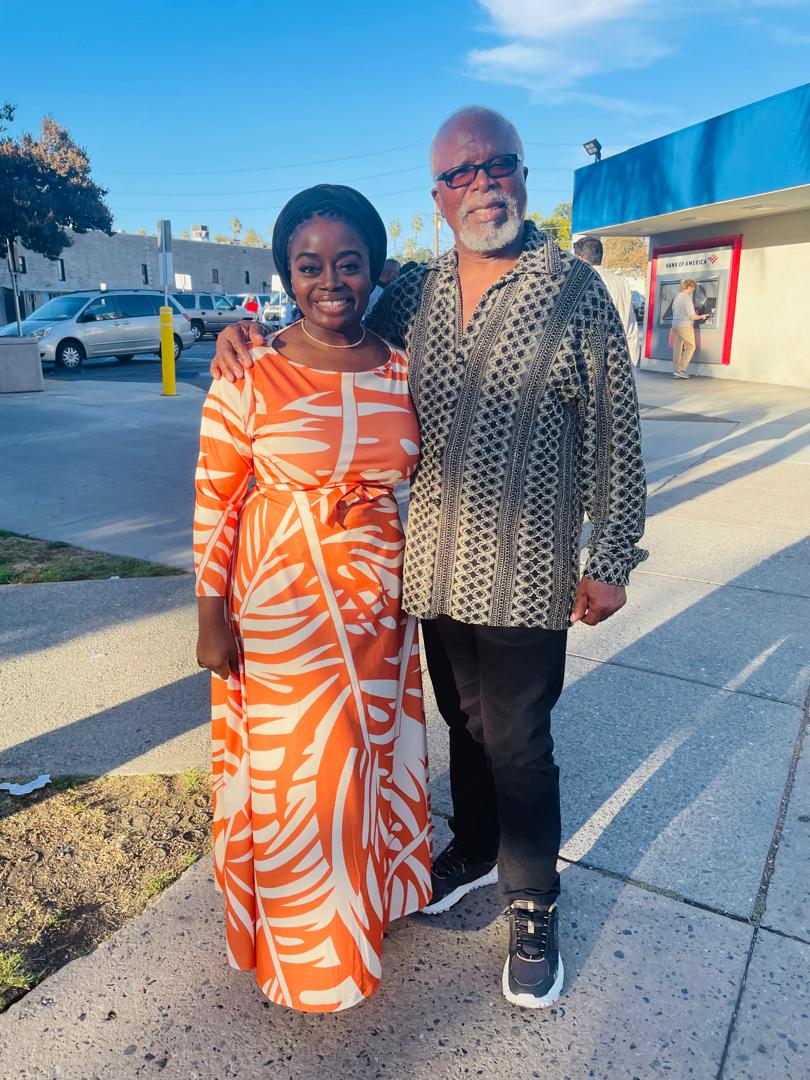
Like Movies, Like Fashion Show
As we were immersed in movies, the African Market also lit up the front lawn of the Historic Hoover Theater, with vibrant colours and lively conversations. Film screenings continued, but the daytime’s highlight was the highly anticipated fashion show. Designers like Sulet Noir, Bamba, and Picasso wowed the audience with their stunning creations. A standout moment? A filmmaker’s adorable son stole the show, strutting down the runway confidently, melting hearts, and bringing smiles all around. It was very heartwarming.
Sunday – Icon Awards Night: The Night of 5 Legends, and 1 Trailblazer
Sunday, October 13, rolled around, and the day was buzzing with energy. The much-anticipated Icon Awards Night celebrated African excellence and the venue glammed up, filled with industry stars dressed in vibrant batik, toghu, and other striking fabrics, beautifully honouring the festival’s roots. The night celebrated not just the established icons but also the rising stars of African cinema. Four incredible icons were recognised: Souleymane Cissé, John Kani, RMD, and Julie Dash, along with the young trailblazer Ozie Nzeribe. Each honoree showcased a new dimension to our understanding of African storytelling. Souleymane shared the importance of preserving our narratives, and John Kani captivated everyone with his powerful words on the impact of theatre and film, sparking spontaneous songs from his plays. Julie’s journey in the industry was inspiring, while RMD reminded us of art’s role in advocating for change.
The night ended on a high note with an afterparty that was pure fire. We danced, laughed, and celebrated our stories, united by a shared passion. Chike Nwoffiah, the festival’s founder, shared powerful reflections on the impact of African cinema and how we can all contribute to its future. His vision was inspiring, and his words on storytelling as a transformative tool hit home. This night was not just an award ceremony — it was a celebration of legacy, a reminder of how far we’ve come, and a call to keep paving the way for future generations.
![]()
Monday – Time to Say Goodbye
Monday arrived with a wave of nostalgia. Exhausted from the programming of the unforgettable festival, I packed my bags. SVAFF 2024 had exceeded my expectations—from vibrant discussions to the inspiring Icon Awards, and to top it off, my wedding anniversary coincided with the festival’s end, making it even more special.
One of the highlights was running into my husband’s cousin, a talented filmmaker whose film won an award. The day wrapped up with a casual chat with Uncle John Kani, who left me with powerful words about authenticity in storytelling: “Always remember where you come from; our stories matter.” His wisdom lingered as I headed to the airport, recalling his earlier lesson on preparation—“the meeting before the meeting.” It felt like an important mantle had been passed.
SVAFF wasn’t just a festival but a celebration of identity, culture, and storytelling. Kudos to Chike Nwoffiah for his humble, visionary leadership in bringing this event to life. The 15th anniversary was more than a milestone; it was a powerful homage to African cinema’s ability to connect communities and inspire future generations. We’re just getting started.
The post Sahndra Fon Dufe: My Unforgettable 2024 Silicon Valley African Film Festival Experience appeared first on BellaNaija - Showcasing Africa to the world. Read today!.
from BellaNaija https://ift.tt/1HMCPjg
via IFTTT
